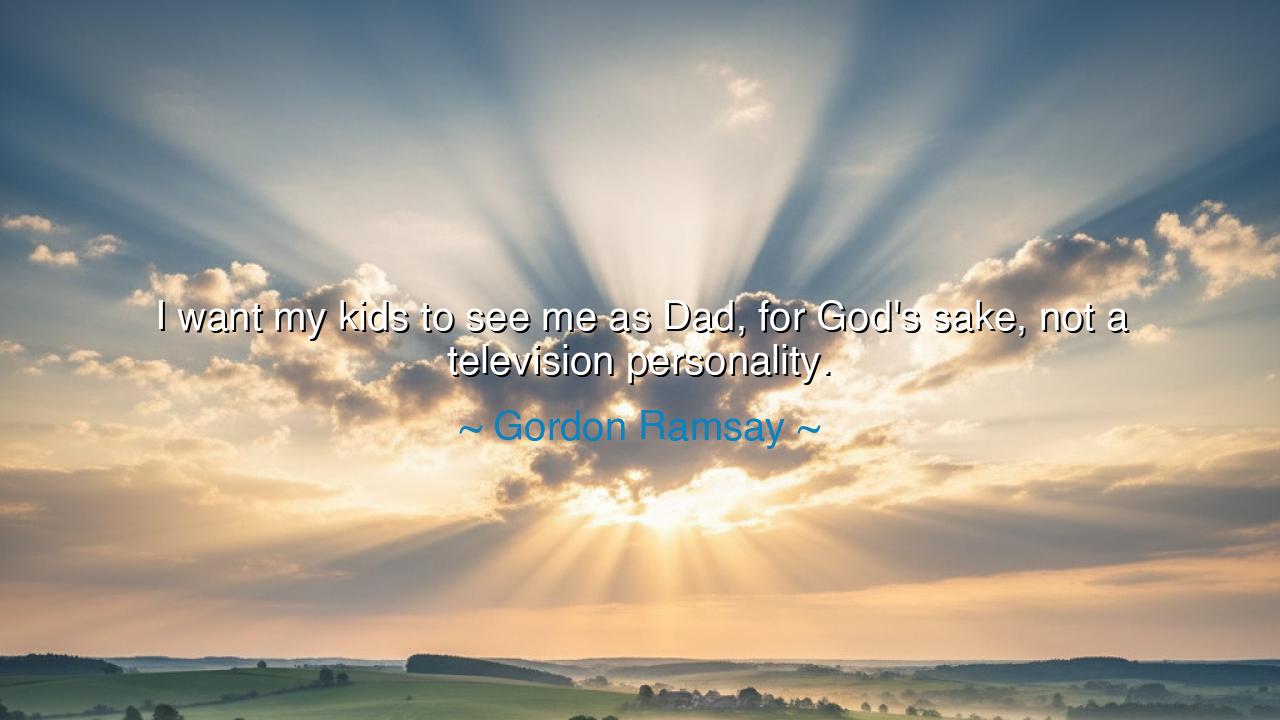
I want my kids to see me as Dad, for God's sake, not a television






The words of Gordon Ramsay — “I want my kids to see me as Dad, for God’s sake, not a television personality” — cut through the noise of fame like a bell tolling in the still night. They are not the boast of a man who has conquered the world, but the plea of a father who has learned that no crown of success can replace the warmth of his children’s trust. Beneath the fire and fury of his public persona lies a truth as ancient as love itself: a man’s truest legacy is not his image before the world, but the heart he leaves within his family.
In this confession burns a struggle as old as civilization — the battle between public glory and private virtue. The ancients knew this well. Kings built empires, poets built fame, and warriors built legend; yet all of them, when twilight came, longed not for the applause of the crowd but for the gentle call of home. For what does it profit a man to be admired by strangers if he becomes a stranger to his own blood? Ramsay’s words remind us that fatherhood is not a title earned through provision or authority alone, but through presence, through being the steady heartbeat in the home while the world demands your soul.
Consider the story of Marcus Aurelius, the philosopher-king of Rome. His wisdom ruled an empire, his writings survived the centuries, yet his letters to his son Commodus reveal a man torn between duty and affection. He feared that his power might rob his child of guidance, that the glare of public life might dim the intimacy of love. In that fear we find the same cry Ramsay gives voice to — the desire to be remembered not as an emperor or a celebrity, but as a father who was truly there. History shows us that wisdom unshared, love ungiven, is a kingdom without heirs.
The life of fame is a consuming flame. It illuminates the world but can burn the soul. The man who is praised by millions may return home to silence, his laughter echoing only in the rooms of strangers. Ramsay, who stands before cameras and commands kitchens with the fire of gods, knows that this light is fleeting. When he says he wants to be seen simply as “Dad,” he speaks of the longing to strip away the masks of the world and stand unguarded before his children — not as an icon, but as a man of flesh and heart, capable of tenderness, forgiveness, and love.
For the eyes of children are sacred mirrors. They do not see our fame or failures; they see only our attention. To them, love is spelled in the small acts — the shared meal, the gentle word, the hand on the shoulder. Ramsay’s plea is the plea of every parent who has chased success only to find that the truest measure of achievement is the light in their children’s eyes. The world may know him as a master chef, but he knows that his greatest creation is not a dish, but the lives he helps shape within his home.
There is also humility in these words. To be seen as “Dad” and not a “television personality” is to reject the false idols of modernity — the applause, the brand, the illusion of perfection. It is to choose authenticity over admiration, love over legacy. The ancients would call this wisdom the return to one’s hearth, the sacred circle where man remembers who he is when the world no longer watches. It is in these quiet spaces, not in the roar of fame, that true greatness is born.
And so, the lesson of Ramsay’s words is clear and enduring: Do not let your work consume the warmth of your home. No success, no wealth, no applause can fill the silence left by absence. Be great, yes — but be present. Let your children know you not as the world knows you, but as only they can — the one who listens, who laughs, who loves without condition. The world will one day forget your achievements, but your children will remember how you made them feel.
For in the end, every man must face this sacred truth: it is not the world that defines us, but the ones who call us “Dad.”






AAdministratorAdministrator
Welcome, honored guests. Please leave a comment, we will respond soon